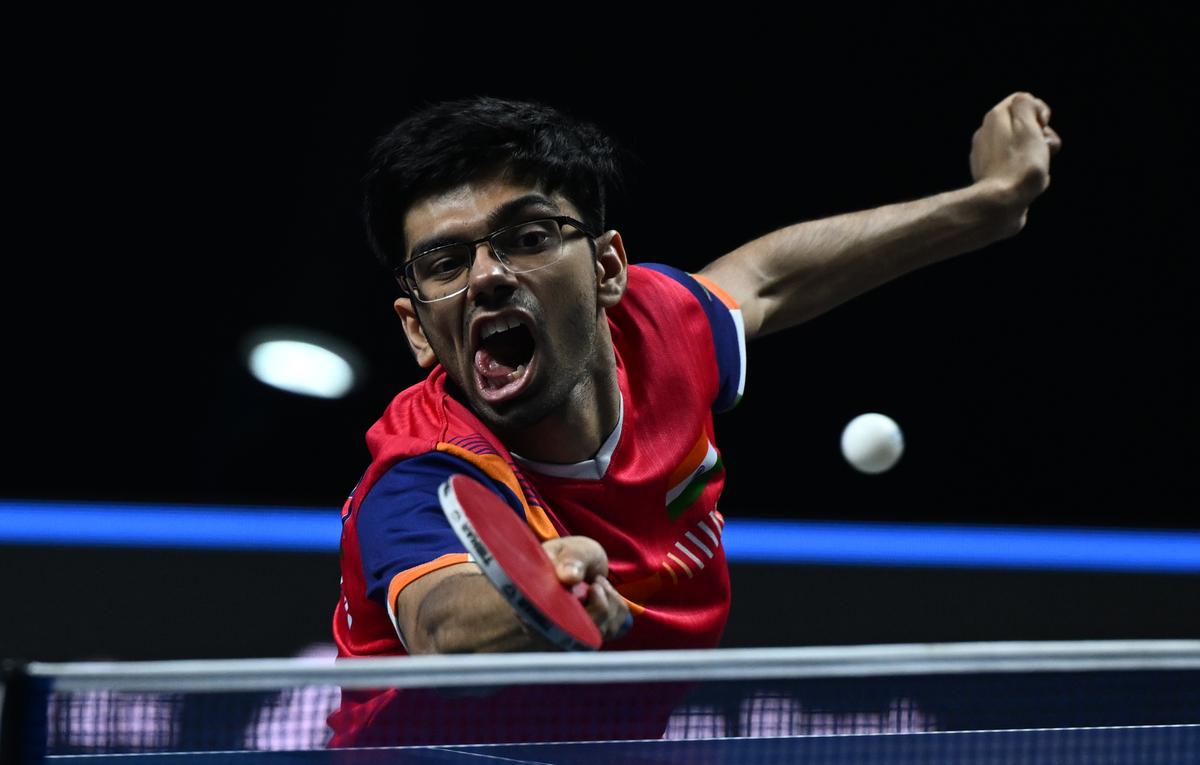Raising his arms, 24-year-old Manav Thakkar swirled his table tennis racquet at the Nehru Indoor Stadium in Chennai, sending the spectators into a frenzy.
Thakkar had just become the first Indian to reach the semifinals of a WTT Star Contender event. And he had achieved it with a huge win over Korea’s Lim Jonghoon, ranked as high as World No. 11 in 2023. Although he lost to France’s Thibault Poret in the last four, he rose to a career-high World No. 47 and became the top-ranked Indian on the strength of his historic run.
The counterpoint
Thakkar also proved several detractors wrong, offering a counterpoint to the view that he would struggle on the demanding professional circuit because he lacked a major weapon.
A rally-player who relies on counterattacks and accuracy to gain points, Thakkar has added a few layers to his game, which didn’t go unnoticed. It was as clear as crystal in the manner in which he defeated Australia’s Finn Luu in the round of 32 and 19-year-old German Andre Bertelsmeier in the last 16 before the defining victory over Lim.
Thakkar was quick on his feet and bent forward to take the ball early, exerting immense pressure on his opponents. He also experimented with his serve, using the side-spin and reverse side-spin variations in addition to his staple, the Tomahawk.
Significantly, he was mentally stronger than before in terms of handling pressure when he was down a few points or facing a tough time against a fancied player. The increased confidence meant he was not averse to going for his shots, which bodes well for the future.
Expanding his range: The Tomahawk is Thakkar’s go-to serve, but he has added the side-spin and reverse side-spin variations to his repertoire. | Photo credit: Getty Images
Thakkar’s strategy and mental ability were in full view in the fourth game against Lim. Trailing 2-6, he won nine points in a row with a wonderful mix of effective serves, excellent third-ball attacks and consistent play from the back of the table.
Lim just couldn’t recover after losing the fourth game. In the fifth game, Thakkar resumed from where he left off, serving well and hurrying the Korean by taking the ball early. Lim could only win one point in the decider.
Thakkar has always aimed to perform well in international tournaments at home, but he hadn’t been able to realise that ambition until the Chennai tournament. In the previous two WTT Star Contender events in India (Goa, 2023 and 2024), he lost in the final qualifying round.
This time, he shattered a mental barrier. “Yes, I finally broke it,” said Thakkar. “I was under quite a lot of pressure. In the last two years in Goa, I didn’t do that well. At the start of the Chennai tournament, I was really under pressure but as soon as the tournament got going, I was quite relaxed.
“Also, the preparation was quite good. We went to Sweden for a training camp, we were also in Bengaluru and we were with National coach Massimo Costantini for a camp for a total of 14 days. I realise, now, I am a bit more mature compared to the last two years.”
From passive to aggressive
Deepak Malik, who coached Thakkar from 2019 to 2021, played a small but important role in the 24-year-old developing into a well-rounded player. “Earlier, he used to play a passive game,” said Malik. “We focused on his forehand and backhand attack. Manav, now, has good mental awareness of his game. He has become more calm and focused and plays confidently against top-ranked players. Technically, he has become more aggressive.”
Thakkar’s commitment to improvement was evident in how he handled the defeat to Poret. For half an hour after the match, he was deep in discussion with Chris Pfeiffer, his personal coach, and Costantini on the finer aspects of his game.
“I was a little upset that I lost a good opportunity,” said Thakkar. “Massimo and Chris said they felt in the semifinal that my touch was still not at its best. It’s how I touch the ball in terms of spin and speed… like the second ball, third ball and fourth ball. They felt we need to work on this touch because now I have good confidence.”
The biggest takeaway from the tournament, the 2018 Asian Games medallist said, was his mental fortitude and composure in crunch moments, something he has worked on.
“The best part is I have become very strong mentally. Like I was very calm and composed in crucial situations. And whenever it was needed, I won the deciders.”
Recalling previous defeats in deciders, Thakkar said, “In 2022 and 2023, I lost 11-12 matches in the decider. I met mental trainer Gayatri Vartak. She used to say, ‘Before each and every point, take time. If you feel very nervous, open your shoelaces, tie your shoelaces and think what you want to do. Like what you want to serve. Just focus on two things. That serve and receive. Don’t think about the outcome’. The whole last year, I have been able to convert those matches also.”

Tough competitor: Thakkar’s strategy and mental ability were showcased in Chennai. Quick on his feet, he bent forward to take the ball early, exerting immense pressure on his opponents. | Photo credit: M. Vedhan
It showed in his results in 2024. He reached the final of the WTT Feeder in Beirut and made two quarterfinals in WTT Contender events in addition to entering the semifinals of the WTT Feeder in Corpus Christi (Texas).
Work in progress
Pfeiffer said Thakkar has incorporated quite a few changes in his game, but insisted that it’s still a work in progress. “He has to work with the ball and against the ball. I think the development in the last month was visible. Now we just need to fix some other things to progress further.”
On Thakkar not having a major weapon, Pfeiffer said it was not a matter of concern. “Of course, it’s also not too easy to bring something new in the game… that becomes very dangerous. When I look back, I can say that the forehand is already much harder and stronger,” he said.
The legendary Sharath Kamal, who has mentored Thakkar, Manush Shah and S.F.R. Snehit over the last few years, felt Thakkar had progressed since the 2024 Paris Olympics.
“In fact, in the last two years or so, the kind of improvement Manav has shown has been really good,” said Sharath. “He has been steadily climbing up the ladder. He reads the opponent’s mind really well. We are trying to work on his physical abilities, putting on a little bit of weight. We are also working on the technical aspects.”
Sharath said he is looking at next month’s World Championships and the 2026 Asian Games as opportunities for Thakkar to make an impression on the big stage. Fortunately for the young Indian, he has a strong support system of coaches, including Sharath as mentor, to chase his dreams. Of winning a doubles medal with Manush at the Worlds, of creating a few upsets in singles, of clinching a medal or two at the Asian Games.
Having tasted what a breakthrough feels like, hope springs eternal for Thakkar.
Published – April 11, 2025 10:47 pm IST




